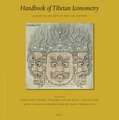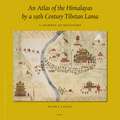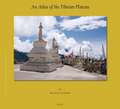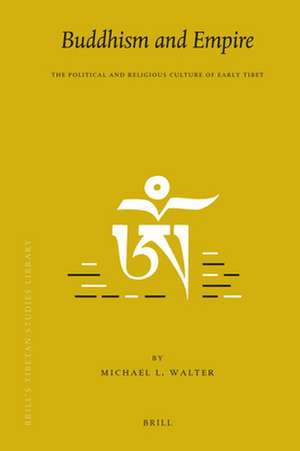Buddhism and Empire: The Political and Religious Culture of Early Tibet: Brill's Tibetan Studies Library, cartea 22
Autor Michael Walteren Limba Engleză Hardback – 23 iun 2009
Following the pattern of Buddhism’s spread elsewhere in Asia, the early Tibetan imperial court realized how useful normative Buddhist concepts were.
This work clearly shows that, while some beliefs and practices per se changed after the Tibetan Empire, the model of socio-political-religious leadership developed in that earlier period survived its demise and still constitutes a significant element in contemporary Tibetan Buddhist religious culture.
Din seria Brill's Tibetan Studies Library
- 18%
 Preț: 973.52 lei
Preț: 973.52 lei - 15%
 Preț: 499.07 lei
Preț: 499.07 lei - 18%
 Preț: 807.63 lei
Preț: 807.63 lei - 18%
 Preț: 905.92 lei
Preț: 905.92 lei - 18%
 Preț: 1003.18 lei
Preț: 1003.18 lei - 18%
 Preț: 739.90 lei
Preț: 739.90 lei - 18%
 Preț: 684.38 lei
Preț: 684.38 lei - 18%
 Preț: 533.41 lei
Preț: 533.41 lei - 18%
 Preț: 720.69 lei
Preț: 720.69 lei - 18%
 Preț: 929.04 lei
Preț: 929.04 lei - 18%
 Preț: 717.98 lei
Preț: 717.98 lei - 18%
 Preț: 716.80 lei
Preț: 716.80 lei - 18%
 Preț: 588.27 lei
Preț: 588.27 lei - 18%
 Preț: 1848.82 lei
Preț: 1848.82 lei - 18%
 Preț: 705.38 lei
Preț: 705.38 lei - 18%
 Preț: 686.92 lei
Preț: 686.92 lei - 18%
 Preț: 689.47 lei
Preț: 689.47 lei - 18%
 Preț: 833.52 lei
Preț: 833.52 lei - 18%
 Preț: 721.37 lei
Preț: 721.37 lei - 18%
 Preț: 728.09 lei
Preț: 728.09 lei - 18%
 Preț: 853.29 lei
Preț: 853.29 lei - 18%
 Preț: 605.09 lei
Preț: 605.09 lei - 18%
 Preț: 606.42 lei
Preț: 606.42 lei - 18%
 Preț: 571.12 lei
Preț: 571.12 lei - 18%
 Preț: 918.05 lei
Preț: 918.05 lei - 18%
 Preț: 633.55 lei
Preț: 633.55 lei - 18%
 Preț: 1117.76 lei
Preț: 1117.76 lei - 18%
 Preț: 959.87 lei
Preț: 959.87 lei - 18%
 Preț: 815.02 lei
Preț: 815.02 lei - 18%
 Preț: 606.10 lei
Preț: 606.10 lei - 5%
 Preț: 707.13 lei
Preț: 707.13 lei - 18%
 Preț: 549.50 lei
Preț: 549.50 lei - 18%
 Preț: 587.23 lei
Preț: 587.23 lei - 18%
 Preț: 594.00 lei
Preț: 594.00 lei - 18%
 Preț: 526.38 lei
Preț: 526.38 lei - 18%
 Preț: 626.06 lei
Preț: 626.06 lei - 15%
 Preț: 499.43 lei
Preț: 499.43 lei - 18%
 Preț: 753.78 lei
Preț: 753.78 lei - 18%
 Preț: 585.70 lei
Preț: 585.70 lei - 18%
 Preț: 660.72 lei
Preț: 660.72 lei - 18%
 Preț: 608.95 lei
Preț: 608.95 lei - 15%
 Preț: 479.01 lei
Preț: 479.01 lei - 18%
 Preț: 723.01 lei
Preț: 723.01 lei - 18%
 Preț: 1057.38 lei
Preț: 1057.38 lei - 18%
 Preț: 701.98 lei
Preț: 701.98 lei
Preț: 905.05 lei
Preț vechi: 1103.72 lei
-18% Nou
Puncte Express: 1358
Preț estimativ în valută:
173.20€ • 178.93$ • 144.15£
173.20€ • 178.93$ • 144.15£
Carte indisponibilă temporar
Doresc să fiu notificat când acest titlu va fi disponibil:
Se trimite...
Preluare comenzi: 021 569.72.76
Specificații
ISBN-13: 9789004175846
ISBN-10: 9004175849
Pagini: 311
Dimensiuni: 155 x 235 x 28 mm
Greutate: 0.64 kg
Editura: Brill
Colecția Brill
Seria Brill's Tibetan Studies Library
ISBN-10: 9004175849
Pagini: 311
Dimensiuni: 155 x 235 x 28 mm
Greutate: 0.64 kg
Editura: Brill
Colecția Brill
Seria Brill's Tibetan Studies Library
Notă biografică
Michael L. Walter, Ph.D. (1980) in Central Eurasian Studies, Indiana University, is Librarian of the Lumbini International Research Institute (Lumbini, Nepal) and a cataloger at Indiana University Libraries. He has published on Tibetan religion and traditional sciences.
Recenzii
'This book expands the range of Old Tibetan Studies. Those who study early Tibet hereafter must consider Tibetan culture in the context of the Eurasian culture complex.'
Kazushi Iwao, The International Journal of Asian Studies 8/2 (2011)
Kazushi Iwao, The International Journal of Asian Studies 8/2 (2011)
